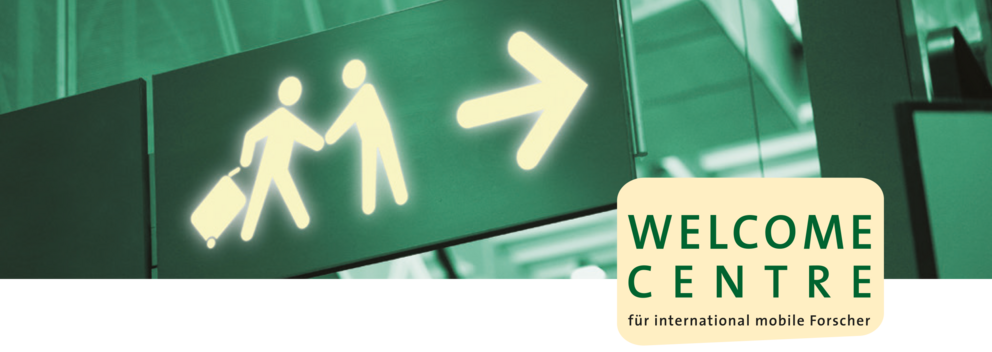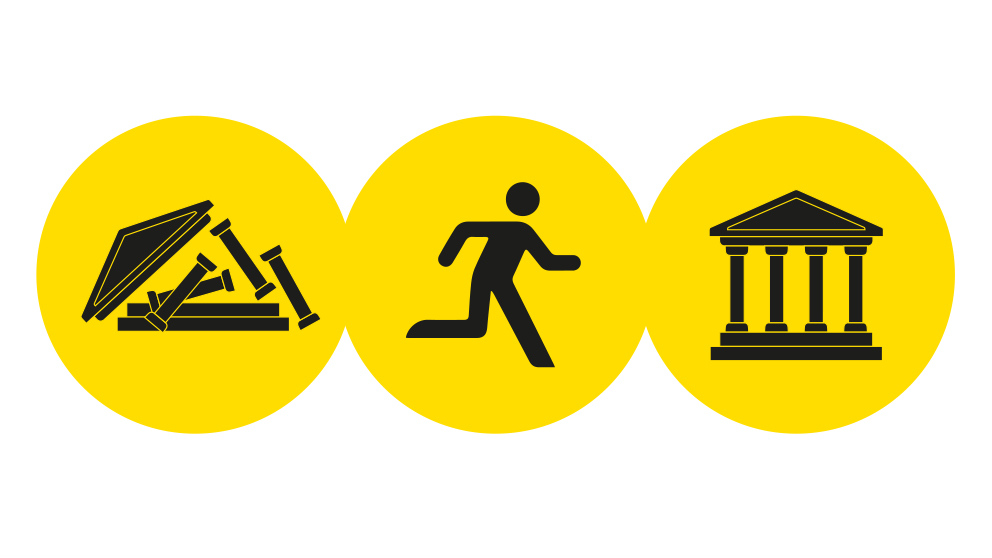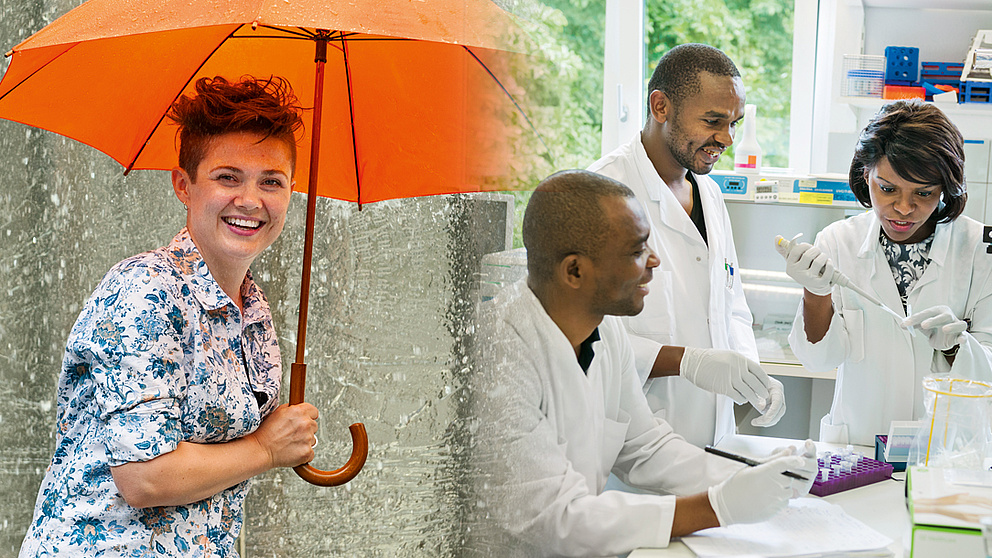Jump to the content
- {{#headlines}}
- {{title}} {{/headlines}}
Welcome to Germany!
Germany is an internationally connected, highly attractive research location. Researchers from all over the world cherish the diversity and openness of the “land of poets and thinkers.” Their work benefits from the academic freedom practised here.
Many of the world’s best scientific minds choose one of the Humboldt Foundation’s attractive sponsorship programmes and spend time conducting research in Germany. We help them and their families to get off to a good start in their new environment and support them during their entire stay. Moreover, for almost two decades, the Alexander von Humboldt Foundation has run various initiatives to promote a culture of welcome in Germany.

The brochure “Fostering a Culture of Welcome in Germany. Ten Years of Ideas Competitions at the Alexander von Humboldt Foundation” summarises the major initiatives of the period 2002-2012. " (in German only)
Welcome Centres

From 2006-2011, the Humboldt Foundation cooperated with the Deutsche Telekom Stiftung and the Stifterverband on the ideas competition “Welcome Centres for internationally mobile researchers.”
The Welcome Centres at German universities are a central point of contact offering advice and support services for visiting researchers and their families. In the Welcome Centres, universities become better acquainted with their visiting researchers from abroad and effectively fit their profile to the needs of foreign academics.
The ideas competition was a huge success: many other universities were inspired by the initiative and the strategies it engendered and went on to establish their own Welcome Centres. The following 13 strategies received awards:
University of Bayreuth
Contact: Frau Dr. Cornelia Nicodemus, Leiterin des Welcome Centre
Tel.: 0049-(0)921-55-5318, E-Mail: welcome-centre[at]uni-bayreuth.de
Bielefeld University
Contact: Frau Eleni Andrianopulu, Leiterin des Welcome Centre
Tel.: 0049-(0)521-106-4880, E-Mail: eleni.andrianopulu[at]uni-bielefeld.de
Ruhr-Universität Bochum
Contact: Frau Anna Gopon, Koordinatorin des Welcome Centre
Tel.: 0049-(0)234-32 28824, E-Mail: Anna.Gopon[at]uv.rub.de
University of Bonn
Contact: Frau Tina Odenthal, Leiterin des Welcome Centre
Tel.: 0049-(0)228-73 6190, E-Mail: tina.odenthal[at]uni-bonn.de
Technische Universität Braunschweig
Contact Frau Kathrin Huter, Mobile Researchers' Centre,
Tel.: 0049-(0)531 391 4394, E-Mail: more[at]tu-braunschweig.de
Chemnitz University of Technology
Contact: Herr Dr. Wolfgang Lambrecht, Geschäftsführer Internationales Universitätszentrum
Tel.: 0049-(0)371 531 35679, E-Mail: wolfgang.lambrecht[at]iuz.tu-chemnitz.de
University of Cologne
Contact: Herr Dr. Johannes Müller, Leiter des Welcome Centre
Tel.: 0049-(0)221-470-6898, E-Mail: international.scholars[at]verw.uni-koeln.de;
j.mueller[at]verw.uni-koeln.de
FAU Erlangen-Nuremberg
Contact: Herr Patrik Stör, Welcome Centre
Tel.: 0049-(0)9131 85-65157, E-Mail: welcome[at]fau.de
University of Göttingen
Contact: Frau Nadine Dreyer, Leiterin des Welcome Centre
Tel.: 0049-(0)551 39-21331, E-Mail: nadine.dreyer[at]zvw.uni-goettingen.de
University of Greifswald
Contact: Frau Imme Burkart-Jürgens, Leiterin des Welcome Centre
Tel.: 0049-(0)3834 420 – 1175, E-Mail: welcome[at]uni-greifswald.de
University of Heidelberg
Contact: Frau Nicole Tsuda, Koordinatorin des Welcome Centre
Tel.: 0049-(0)6221 542134, E-Mail: tsuda[at]zuv.uni-heidelberg.de
Philipps-Universität Marburg
Contact: Frau Carmen Fels, Welcome Centre, Referentin "Incomings"
Tel.: 0049-(0)6421-28-24954, E-Mail: carmen.fels[at]verwaltung.uni-marburg.de
Technische Universität München
Contact: Frau Katrin Toborg, TUM.Family - Welcome Center
Tel.: 0049-(0)89-289-22266, E-Mail: toborg[at]zv.tum.de
Guest houses and international meeting centres for researchers
Since the 1960s, the Humboldt Foundation has established a total of 67 guest houses and international meeting centres for researchers (IBZ) at 49 university locations Germany-wide. Visiting researchers and their families can find accommodation there for the duration of the research stay. Living in these houses makes it easy to meet German and foreign colleagues, for example at local scientific and cultural events.
Robust research alumni activities in Germany
The Humboldt Foundation is responsible for having secured research alumni activities a firm place on the agenda in the framework of thecollaborative project“International Research Marketing.”
Research alumni are scientists and scholars who have spent time working on research in Germany as doctoral and post-doctoral researchers, or at a more advanced stage of their working lives, before continuing their academic careers in other countries.They are ideal multipliers who can inform junior researchers in their specialist networks about the opportunities and potential for a research stay in Germany and spark their enthusiasm.Research alumni can also support their former host institutions strategically – for example to establish worldwide networks and collaborations – or assist them in making strategic decisions on internationalising their university or research institution.
At the following institutions, structures for research alumni activities have been established thanks to Humboldt Foundation sponsorship:
More information on researcher-alumni work
- Research alumnae/alumni on LinkedIn Networking, sharing ideas, presenting examples of best practice and planning networking meetings. In the future, all this can happen here.
- Ideas for successful research alumni activities (PDF, 603 KB)
- Ideas for successful research alumni activities abroad (in German only) (PDF, 517 KB)
Philipp Schwartz Initiative – university refuge

Their own countries are riven by war, their freedom of research is curtailed, or they are subject to persecution: in many parts of the world, researchers are under threat and have to flee their homes. The Philipp Schwartz Initiative helps refugee researchers to find their feet at German universities and research institutions.
The programme was conceived in 2015 by the Humboldt Foundation and the FederalForeign Office. In order to protect researchers who are persecuted or at risk, we cooperate closely with international partners such as the Scholars at Risk Network, the IIE Scholar Rescue Fund and the Council for At-Risk Academics.

